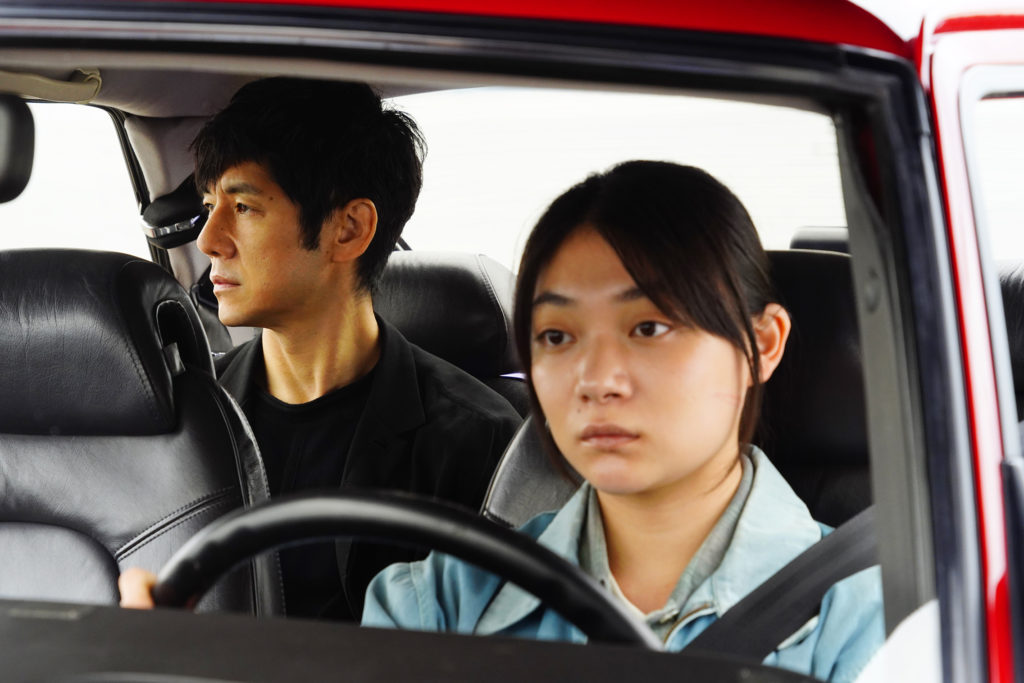Review by David Baldwin

179 minutes. That’s how long Co-Writer/Director Ryusuke Hamaguchi’s film Drive My Car is. I heard unanimous praise coming out of Cannes for the film — where it won Best Screenplay, the FIPRESCI Prize and the Prize of the Ecumenical Jury, not to mention being In Contention for the Palme d’Or — but all I could fixate on was the length. It was daunting and trying to schedule watching it during TIFF in September alongside 40+ other films was a logistical nightmare and a battle that I lost all too quickly. Instead, I just continued hearing the unanimous praise and continued seeing the film’s poster taunting me on Letterboxd as one of the “Highly rated films you’ve yet to see”.
So when the time came to finally watch Drive My Car a few weeks back, after it being chosen as Japan’s Best International Feature entry for the Academy Awards, I was filled with trepidation and anxiety. Adding to the pressure, multiple critics’ groups had started calling it the Best Foreign Language Film of the year and last week, the NYFCC straight up awarded it as the Best Film of the Year period. Could the film match what I had been picturing for months? Would I be able to watch it all in one sitting (quick answer: no)? How the hell did Hamaguchi and Co-Writer Takamasa Oe manage to turn Haruki Murakami’s short story into a 3 hour film?! All of these thoughts were swirling in my head, and continue to as I finally settle down to write this. It seemed patently wrong to dismiss it entirely because of its gargantuan running time. A film like this was too important not to watch.

After a 40-minute Prologue that could be considered an enchanting, sensual Short Film all on its own, the Opening Credits roll as we watch Stage Director/Actor Yūsuke Kafuku (Hidetoshi Nishijima) drive to Hiroshima to mount a production of Anton Chekhov’s Uncle Vanya for a local theatre festival. He is suffering immense grief from the loss of his wife two years prior, and despite his objections, ends up taking the titular role. He demands his hotel be an hour away from the rehearsal space — as to give him time to practice his lines while driving in his red Saab 900. The organizers okay the hotel request, but assign him a personal driver, Misaki Watari (Tōko Miura), for the duration of his employment with the festival. She is quiet and introverted, driving smoothly and listening in silence as Kafuku practices his lines endlessly on the hour long drive. As their time together grows, they begin to learn more about each other and the traumas that linger in their pasts.
That may sound like a long lead up just to land on an atypical, predictable romantic melodrama. Much to the contrary however, Hamaguchi’s film is not preoccupied by much romance outside of the Prologue and a few choice scenes, none of which involved Kafuku and Misaki. No, he is much more interested in the budding friendship, comradery and emotional investment these two souls find within each other as they are confined mainly within such a small space. They are broken individuals, haunted by their past and internalized grief. They found each other cosmically in this moment as a means of helping one another move on from their trauma. And beyond rehearsals and after hours drinks, that is very much what Drive My Car is: a beautifully shot, moving drama about connection and grief, centred around a Japanese theatre company putting on a play. Hamaguchi lingers on these two characters and the actors/producers that orbit around them (specifically Masaki Okada as hot shot young actor Kōji Takatsuki that has a connection to Kafuku’s past), watching as their faces twitch and contort out of expressionless glances, suggesting something much deeper is hiding just under the surface. While the supporting cast is great, it is the thematically resonant performances by Nishijima and Miura that keep us invested.
While Drive My Car is not going to be for everyone — the pacing, the style and the metaphorical nature of so much of the film will drive casual viewers crazy — I enjoyed it for the most part. I think it could have used a trim here and there to tighten it up, but the longer I sit with it, the longer all of Hamaguchi’s decisions make sense. He needs the lengthy Prologue in order to bring these wayward souls together. Without it, he would be stuck with a repetitive flashback structure that would only cause the film to feel more drawn out. And the characterizations would not have the same level of depth and emotion. All this to say, watching a film that runs 179 minutes is a genuine commitment. But it is a commitment you will not easily forget.
Drive My Car is playing in Select Theatres across Canada now.
It opens in Halifax, Hamilton and Vancouver today, as well as at the Carlton Cinema in Toronto.
Additionally, it is currently playing at the TIFF Bell Lightbox in Toronto.
For additional cities and theatre information, please check out the Films We Like website.